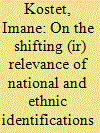| Srl | Item |
| 1 |
ID:
190767


|
|
|
|
|
| Summary/Abstract |
Based on three rounds of in-depth interviews, this article discusses the various ways in which children negotiate ethnic and national identities in a majority-minority city. I examine which identity labels children identify with, which relevance they attach to those labels, how they define these inclusively or exclusively and what these labels reveal about their senses of belonging. Children negotiate identity in myriad and creative ways and, while doing so, challenge public and political discourses by creating inclusive categories which transcend ethnic or national boundaries. I further show how, approximately 20 months after the first research round, the children retrospectively reflect on their self-identifications, may alter their initially chosen identity labels, and critically question the importance they once attached to those identities. The results contribute to a deeper understanding of children’s reflexivity and agency while dealing with their identity in a super-diverse environment.
|
|
|
|
|
|
|
|
|
|
|
|
|
|
|
|
| 2 |
ID:
165702


|
|
|
|
|
| Summary/Abstract |
For super-diversity to describe the diversification of Asian global cities, it should be discussed with reference to existing regimes governing diversity. In Singapore, the postcolonial state instituted the multiracialism of equality between the ‘races’ of colonial governmentality, so as to manage the ethnic diversity of ‘the plural society’. However, contemporary immigrations disrupted this multiracialism. The political response focused on managing the mobilities of low-wage migrant workers. Drawing on my research on urban change, I show that the this led to the bio-political management of migrant worker mobilities and articulation of the discourse of needs. I argue that the 2013 riot by migrant workers accelerated the production of dormitory space to exclude migrant workers from access to the city and reproduce their physical needs. The case of Singapore shows that we need to ‘moor’ the understanding of super-diversity in Asian global cities to the postcolonial management of diversity and migration.
|
|
|
|
|
|
|
|
|
|
|
|
|
|
|
|